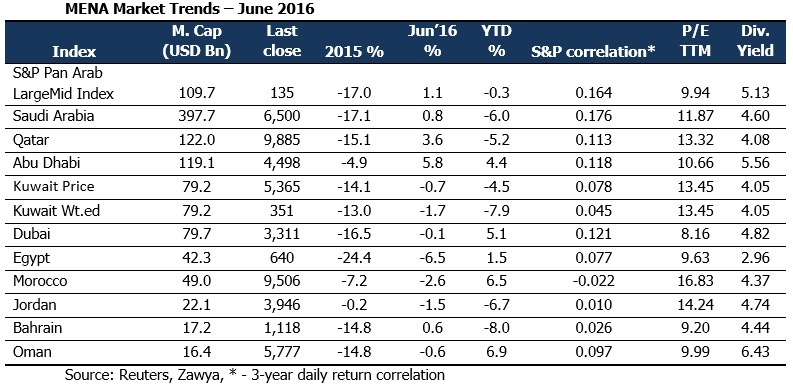أداء مختلط لأسواق الشرق الأوسط وشمال أفريقيا، واستقرار أسعار النفط بعد الانسحاب المفترض للمملكة المتحدة من الاتحاد الأوروبي

Blue Chips had a mixed June, with National Bank of Abu Dhabi (UAE) and Saudi Electric Co. (SEC) ending the month at the top, gaining 23.8% and 18.3%, respectively. National Bank of Kuwait and Kingdom Holdings (KSA) witnessed a slump, losing 6.3% each in June. The boards of directors at National Bank of Abu Dhabi and First Gulf Bank have recommended merging the two lenders, which will create a regional powerhouse with USD 175bn in assets. The merger is part of Abu Dhabi’s plan to create a bank that could compete in size with regional giants, such as Qatar National Bank. Saudi Arabia’s state electricity utility, SEC, sought bids from international developers to build two solar-power plants in the kingdom’s northern region. The plants will each generate as much as 50 megawatts using photo-voltaic technology, which produces power directly for solar cells.
Brexit and the GCC
The outcome of the vote and the resultant decision of Britain to leave the European Union (EU) caught the financial markets by surprise. The broad sell-off across continents and asset classes could be because of misplaced initial expectations for a “Remain” victory. GCC markets remained relatively unscathed except for UAE markets; Dubai index lost 3.3% while Abu Dhabi lost 1.8%. Dubai being largely a service economy driven by trade & services, tourism and real estate witnessed a fall as British pound lost 7.2% in value against UAE Dirham.
Impact on oil would be minimal since Britain consumes only 1.6% of global consumption and ranks 15 among global consumers. The more serious impact would be if there is contagion to the rest of the European Union. Imports from the UK will become cheaper, such as cars, capital equipment etc. Sovereign Wealth Funds (SWFs) and HNIs in GCC are known to invest heavily in London's real estate. Investors from the UAE accounted for more than 20% of buy-to-let property sales in the UK in 2015. On the other hand, a steep fall in real estate prices in Britain (especially London) may also see fresh investments from GCC into the country because of bottom fishing.
GCC region has been in talks with EU region for over 25 years and the Free Trade Agreement (FTA) between the regions is still pending. Having lost of access to EU, Britain to sustain its exports would be aggressive to sign bilateral trade deals. This presents an opportunity for GCC regions, especially Dubai, as it acts as a trading hub for MENA region as well as a gateway for African continent.
Oil Market Review
Brent crude remained flat in the month of June, closing at USD 50 per barrel; marginally lower than May’s close (-0.02%). Earlier in the month, Brent crude dropped down to a seven-week low of USD 47.16 per barrel, as the aftershocks of the Brexit decision continued to ripple through the financial markets. Speculation regarding other EU members following suit affected markets worldwide, but this did not prevent oil prices registering their biggest quarterly gain (25.5%) in seven years.
